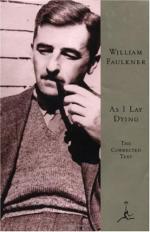|
|
As I Lay Dying Author/Context
William Faulkner (1897-1962)
William Cuthbert Faulkner was born into a world heavily burdened and illustrated by America's strong Southern culture. His paternal heritage is richly decorated by heroism, giving him little need to study history through a textbook as a young boy. Since his father worked at the University of Mississippi in Oxford, his parents constantly encouraged reading outside of formal education. Faulkner lives America's history in his daily life and relationships, thereby gaining insight into the Southern mentality. He leaves high school shy of graduation to work in his grandfather's bank. Despite his lack of formal education, Faulkner reads extensively and surrounds himself with modern culture. He tries to enlist in the Air Force during World War I, but is rejected due to his small size. Faulkner then travels around the South, New York, and spends a lot of time in Europe. He returns to Mississippi, marries his high school girlfriend Estelle Oldham Franklin, and holds many odd jobs while he writes short stories and novels.
Faulkner's extensive body of work takes place almost entirely within his fictional setting of Yoknapatawpha County, a Southern world in which characters intermingle freely and human nature is explored in a realistic venue. This connection with the South yields the following novels: The Sound and the Fury; As I Lay Dying; The Hamlet; Mosquitos; Absalom,Absalom; and many more. Faulkner's name becomes synonymous with the South and the provincial, namely plain people. He becomes as important to Southern literature as Yeats becomes to Irish literature and is hailed as a sociologist and staunch observer of human nature. According to Faulkner scholar Cleanth Brooks, "Faulkner's treatment of history is, then, a confirmation of our disowning the past, Faulkner's famous county (obviously a rural slum) a way of reminding us how far we have progressed" (Brooks 4). Although associated with the American South, his talent and work extend far beyond the confines of Yoknapatawpha.
As I Lay Dying was scribbled on the back of a wooden wheelbarrow until its publication while Faulkner worked at an electric company shoveling coal. He came up with the title the day after the stock market crashed on Wall Street. As I Lay Dying is often considered Faulkner's most accomplished work. It takes a simple plot and examines human nature on a journey both metaphorically and physically. Written as a series of inner monologues and thoughts by different characters, Faulkner takes the reader on an emotionally disturbing and sometimes confusing voyage not only through Yoknapatawpha County, but through the human psyche. Faulkner's lengthy sentences and disjointed writing and paragraphs often make his stories difficult to absorb at times, creating a divide between his readers.
As I Lay Dying hails not only as a voyeuristic eye into the rural slums of Mississippi, but as a pastoral novel and staunch examination of humanity under duress. Despite its mixed reactions amongst critics and readers, Faulkner's powerful novel delivers several universal messages including the fact that "Man's capacity to spend himself in a cause is always a remarkable thing and nowhere more so than when it springs from an unlikely soil" (Brooks, 94). Because of Faulkner's ability to express these themes in novel methods, As I Lay Dying hails as one of the classics of American literature.
William Faulkner died of a heart attack in 1962, soon after falling off of a horse in Oxford, where he is buried. His literature is studied in every high school and college as a staple in American history and literature and has won countless awards, including the Pulitzer Prize and the National Book Award. There is currently a William Faulkner Prize for Literature for budding American writers.
Bibliography
Blotner, Joseph. Faulkner: A Biography. Vintage Books: New York, 1991.
Brooks, Cleanth. William Faulkner: First Encounters. Yale University Press: New Haven, 1983.
Brooks, Cleanth. William Faulkner: The Yoknapatawpha Country. Louisiana State University Press: Baton Rouge, 1963.
Faulkner, William. As I Lay Dying. Random House: New York, 1930.
Howe, Irving. William Faulkner: A Critical Study. Elephant Paperbacks: Chicago, 1951.




